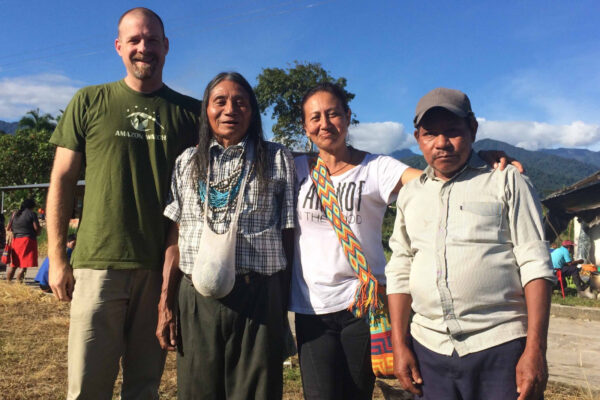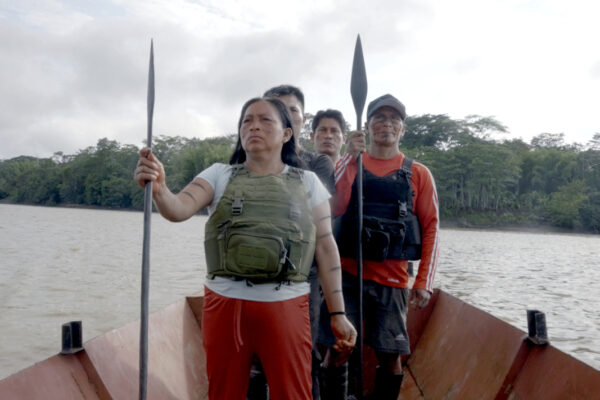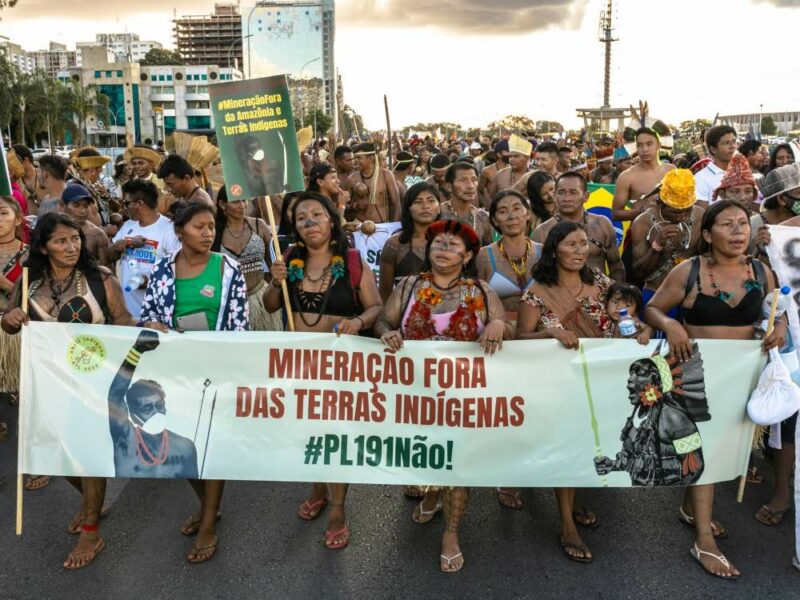A new report from Amazon Watch shows for the first time how firms that fuel the destruction of the Brazilian Amazon under Brazil’s new president openly trade with and receive financing from a range of companies and major investors in Europe and North America. Although these producers of soy, cattle, and timber for export have documented links to illegal deforestation, corruption, slave labor, and other crimes, they nonetheless do business with investors and companies based in countries that are Brazil’s three largest trading partners: China, the European Union and the United States.
“The good news is, if European and North American financiers and commodities buyers cut ties with Brazilian bad actors, they could use their market power to send a signal to Brazil’s leadership that the global community will not tolerate the policies of the new administration,” said report lead author, Christian Poirier of Amazon Watch. “But if they continue to support Brazilian companies, they should be ready to shoulder the blame for the destruction of rainforests and the abuse of indigenous peoples.”
The report, produced in collaboration with the National Articulation of the Indigenous Peoples of Brazil (APIB), the Brazilian coordinating organization for the country’s indigenous peoples, identifies and examines the business dealings of the Brazilian companies behind the increase in illegal deforestation from 2017 through the beginning of 2019. It traces the links of the firms to European, U.S. and Canadian corporate buyers and the investors that fund their activities. The findings provide insight into the role of foreign economic actors in driving agro-industrial expansion into tropical forests, as described in recent peer-reviewed studies. The Amazon Watch report is being released against the backdrop of a growing trend of land invasions in Brazil, with indigenous peoples and other rural communities reporting a dramatic increase in conflict arising from efforts to expand plantations and cattle ranches on to their lands.
“If things are going to change, we are going to need help,” said Sônia Guajajara, Executive Coordinator of APIB. “So we are asking that international consumers boycott Brazilian agribusiness products until the Brazilian government definitively addresses the question of indigenous land demarcations and acts of violence against indigenous peoples. We want peace, so that our peoples can live a just a dignified life.”
“This research demonstrates how global markets sustain the worst actors in Brazil’s agro-industrial sector,” said Poirier of Amazon Watch. “They support the Brazilian firms that are most responsible for growing deforestation and for the rise in human rights violations against indigenous peoples and other rural communities. They are also key to advancing President Bolsonaro’s reckless attacks on social and environmental protections. This report shows that Europeans and North Americans are part of the problem, but also how they can also be part of the solution.”
The release of today’s report coincides with Brazil’s annual “Terra Livre” mobilization, which convenes thousands of indigenous peoples in the country’s capital to demand that the Brazilian government respect their rights. This year’s events take on a new urgency, given the Bolsonaro government’s recent rollbacks on social and environmental protections.
The following are among the findings that trace the link between deforestation in Brazil and consumers, companies and financiers in the EU and the US:
- A company that supplies Germany’s high-end organic supermarkets with purees, smoothies and powders imported 9.1 tons of acai pulp from Argus Comercio e Exportação de Alimentos. The owner, Arnaldo Andrade Betzel, is a partner in several companies in the state of Pará and has longtime operations in timber as well as in fruit pulp sectors. Between 2017 and 2018 Mr. Betzel was fined US$ 570,000 for illegal deforestation in Pará.
- Brighton Collectibles, an accessories store found in malls and main streets across the United States, received twenty-eight shipments of bovine leather totaling 4.4 tons from Italian tannery Faeda, which received leather imports from Frigorífico Redentor, a subsidiary of the family-owned the Grupo BIHL, fined $1 million for illegal deforestation. The Bihl family was the target of Brazil’s 2009 Federal Police investigation, known as “Operation Abate,” which ultimately put four of the Bihl brothers in jail for giving bribes to public servants and inspectors in the company’s ranching operations.
- The UK company Nordisk Timber Eireli, which extracts and commercializes native wood from the Amazon and supplies a range of leading hardwood companies in Belgium, the UK, the Netherlands and the U.S. Between 2017 and 2018, Nordisk was fined US$ 3.9 million for lack of environmental oversight over traded wood.
- Dozens of name brand investors, including Credit Suisse (Switzerland), Commerzbank (Germany), BNP Paribas (France), Barclays (UK), JPMorgan Chase (US), and leading U.S. asset managers such as BlackRock, Vanguard, and State Street bankroll the bad-acting Brazilian companies and the global soy trading companies profiled in the report.
Methodology
To identify the European and North American companies cited in the report, Amazon Watch analyzed major fines for illegal deforestation committed by 56 Brazilian companies that were levied by the Brazilian environmental enforcement agency IBAMA since 2017. This data, provided by Profundo, a Netherlands-based, independent not-for-profit research firm, was then cross referenced to identify how the products of these environmental offenders reach northern markets.
The research identified 27 importing companies and commodity traders doing business with the Brazilian companies. It also revealed a range of financial connections between dozens of high-profile international financial institutions and both leading Brazilian meatpacking companies and top global commodity traders distributing soy to global markets.
The role of international actors
The new Amazon Watch report documents the significant role of foreign actors, whether they are commodities buyers or financial institutions bankrolling the activities fueling deforestation in Brazil.
In doing so, the report is consistent with research published last year in Science, which found that more than a quarter of global tree cover loss between 2001 and 2015 was associated with commodity-driven deforestation. That study’s authors noted that their findings should be of particular interest to the hundreds of global companies that are failing to meet their commitments to zero deforestation by 2020, said they found most concerning the amount of “permanent” conversion of forest taking place every year to produce commodities like beef, minerals, oil and gas, palm oil and soy – all concentrated for the most part in the tropical forests of Latin America and Southeast Asia.
“Brazilian civil society has very little control of international markets fueling human rights abuses and environmental destruction,” said Poirier. “Our research shows many of us are buying products that are destroying the forests illegally. We have leverage; with the help of these influential actors, we can begin to have some impact on a regime that is out of control.”
Indeed, a study released last month by European researchers found that one-sixth of the carbon emissions caused by the diet of EU consumers can be linked directly to deforestation in tropical forest countries. “As consumers, these findings and ours show that we can put pressure on the market by changing our consumption patterns,” Poirier said.
Financial actors also play a key role. A peer-reviewed study, released late last year by researchers at Stockholm University, suggests that financial giants “punch below their weight,” when it comes to using their influence to protect forests and the climate.
“Asset managers like BlackRock and Vanguard wield significant power over the agribusiness traders operating in Brazil,” said Moira Birss, Finance Campaign Director at Amazon Watch and a co-author of the report. “BlackRock, in particular, has tried to paint itself as a responsible corporate actor. But in the context of Brazil’s massive rollback on rights and environmental protections, BlackRock’s actions – including its recent expansion of offices in Brazil – demonstrate the opposite of responsibility. Right now BlackRock has an important choice: will it continue to be complicit in the destruction that Brazilian President Jair Bolsonaro has planned for the Amazon, or will it take action to moderate it?”
Impact on biodiversity, deforestation of assaults on Indigenous Peoples
Amazon Watch releases its report on the eve of the release of the 2019 Global Assessment Report on Biodiversity, the world’s first global assessment of biodiversity to systematically examine and include indigenous and local knowledge. It is already well established that indigenous peoples are the best defenders against deforestation and are increasingly recognized for their key role in protecting biodiversity and safeguarding traditional knowledge
These are the people the Brazilian government treats as obstacles to development, according to Amazon Watch, which cites signs that Brazil is experiencing its most severe assault on social and environmental protections in 30 years, with actions that fall particularly hard on indigenous forest peoples:
- As of March, at least fourteen cases of illegal invasions of indigenous territories were documented across Brazil, mainly in the Amazon, a rise of 150% since Bolsonaro took power. Indigenous leaders cite inflammatory language on the part of government leaders for encouraging land grabbers, illegal loggers, and wildcat miners and for driving a wave of land invasions.
- Agriculture and Ministry of Mines and Energy both announced their plans to alter Brazilian legislation to permit industrial activities in indigenous territories. Such a move could have profound implications for the wellbeing of indigenous communities and the lands upon which they depend, according to the authors of the Amazon Watch report.
- The new government has stripped the federal indigenous agency of its mandate to grant title to indigenous territories, transferring this authority to the Agriculture Ministry, which is led by anti-indigenous hardliners. The agency has been starved of funds and is currently operating on 10% of its allotted budget, forcing it to abandon key service and monitoring outposts in rural communities.
- Brazil’s Environmental Ministry (MMA) has also suffered significant cuts, restructuring, and loss of autonomy since Bolsonaro came to power. The ministry no longer has the jurisdiction to combat deforestation, which was among the principal roles of the country’s environmental policy since 1980.26 And the new Environment Minister has moved to inhibit the enforcement agency IBAMA from cracking down on environmental crime.
“When it comes to monitoring deforestation and protecting the rights of forest guardians, the fox is guarding the hen house in Brazil,” said Sônia Guajajara. “The deadly mining waste disaster in the state of Minas Gerais, which killed hundreds of people, underscores the need for improved, not reduced, environmental oversight, but that is not the path the new government is taking.”
* Note: Amazon Watch’s Complicity in Destruction II report cites the business relationships of international companies – including importing companies, traders, and financial institutions – that do business with Brazilian companies fined by the environmental enforcement agency IBAMA for illegal deforestation and other related crimes since 2017. These fines are available for the public on IBAMA’s website.
The report does not contend that Argus was involved in these irregularities, nor does it claim that Acai GmBH was sourced from areas penalized for environmental crime. What our findings state is the following: that two companies owned by Arnaldo Andrade Betzel – Benevides Madeiras and Argus – trade with a range of European importing companies, mainly in the timber sector, but also that Argus sold Acai GmBH 9.1 tons of açaí in 2018.
Our report shows that northern companies are (often unwittingly) sustaining the behavior of bad actors operating in the Brazilian Amazon. The report does not “attack” the global companies cited in the report, but rather recommends that these companies use our findings to better understand problems in their supply chains (or financial portfolios), which will potentially encourage them to cut ties with or enter into dialogue with these problematic actors.
Below is a response to our report that we received from ACAI GmbH.
ACAI GmbH confirms to have purchased 8,860 kg (net weight) of acai puree for testing purposes from ARGUS.
We consider initiatives to uncover illegal rainforest use and prevent any cooperation with the actors involved to be very important and are happy to support them through our business practices. However, the mentioned legal processes have nothing to do with the production of the acai puree, which we obtained uniquely from ARGUS/GOOLA at the time. The fruit pulp-producing company ARGUS/GOOLA has, according to our knowledge, at no time made itself liable to prosecution for illegal rainforest use. The products purchased from us therefore do not originate from illegal rainforest use. Acai pulp is not a wood product, but the puree from a fruit, which is picked from an existing tree population.
Even though the activities of ARGUS/GOOLA are clean, we will not support any companies with shareholders who are exploiting the rainforest as part of other companies. However, this question does not currently arise for us, as we currently no longer have any business relations with ARGUS/GOOLA.
The press release not only implies that we have imported products resulting from illegal deforestation but also that we pass these on to the two named retail partners. This is not true in two respects: First of all, the acai puree from ARGUS/GOOLA did not originate from illegal deforestation (see explanation above). Moreover, the acai products supplied to these retail chains do not come from ARGUS but from another manufacturer.













